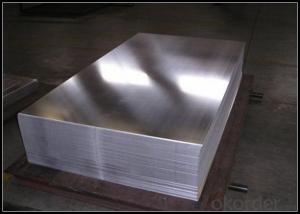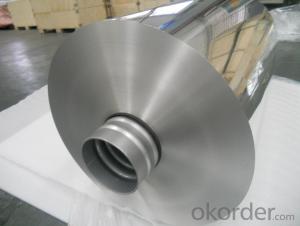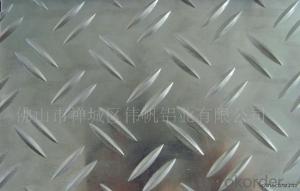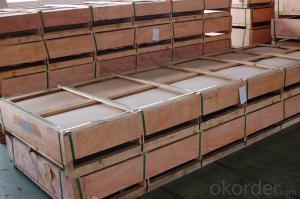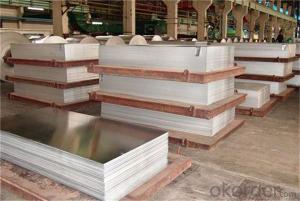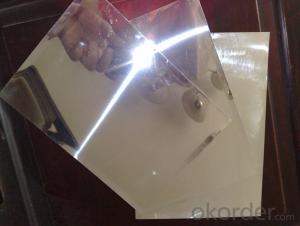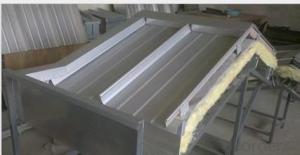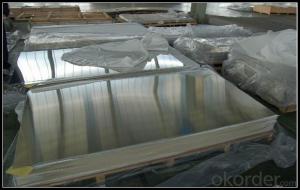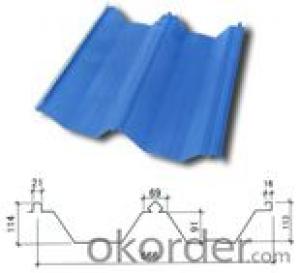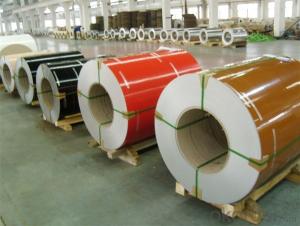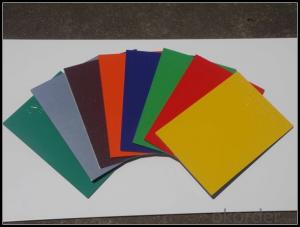Colored Corrugated Aluminum Alloy Sheets for Metal Wall Systems in Las Vegas
- Loading Port:
- Shanghai
- Payment Terms:
- TT OR LC
- Min Order Qty:
- 5 m.t.
- Supply Capability:
- 10000 m.t./month
OKorder Service Pledge
OKorder Financial Service
You Might Also Like
Specification
1. Specification of Corrugated Aluminum Alloy Sheets for Metal Wall Systems
Alloy Number | AA5XXX |
Temper | H12, H14, H16, H18, H22, H24, H26, H32, HO, F |
Thickness | 0.1mm – 500mm |
Width | 10mm- 2200mm |
Standard | GB/T3880-2006, ASTM, ISO, EU standard |
2. Application of Corrugated Aluminum Alloy Sheets for Metal Wall Systems
(1).Interior: wall cladding, ceilings, bathrooms, kitchens and balconies, shutters, doors...
(2).Exterior: wall cladding, facades, roofing, canopies, tunnels,column covers , renovations...
(3).Advertisement: display platforms, signboards, fascia, shop fronts...
3. Feature of Corrugated Aluminum Alloy Sheets for Metal Wall Systems
Surfact Quality :
Be free from Oil Stain, Dent, Inclusion, Scratches, Stain, Oxide Dicoloration, Breaks, Corrosion, Roll Marks, Dirt Streaks and other defect which will interfere with use,
Mechenical Property:
Chemical Composite and Mechanical Property
4. Certificate:
SGS and ROHS(if client request, paid by client), MTC(plant provided), Certificate of Origin(FORM A, FORM E, CO), Bureau Veritas and SGS (if client request, paid by client), CIQS certificate
5. Image of Corrugated Aluminum Alloy Sheets for Metal Wall Systems
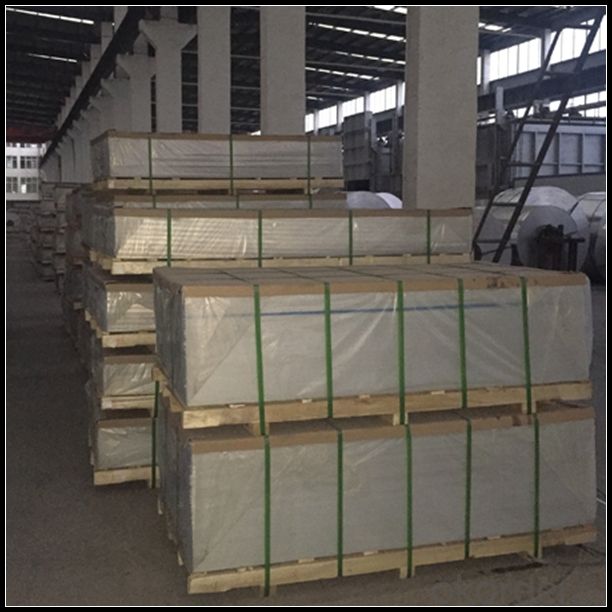
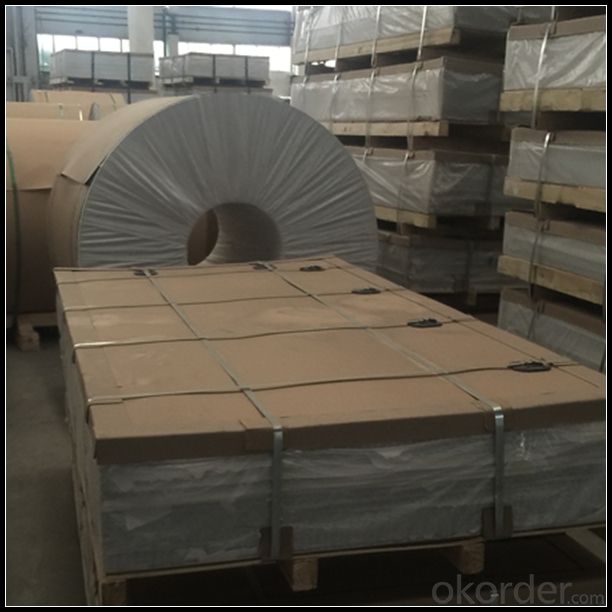
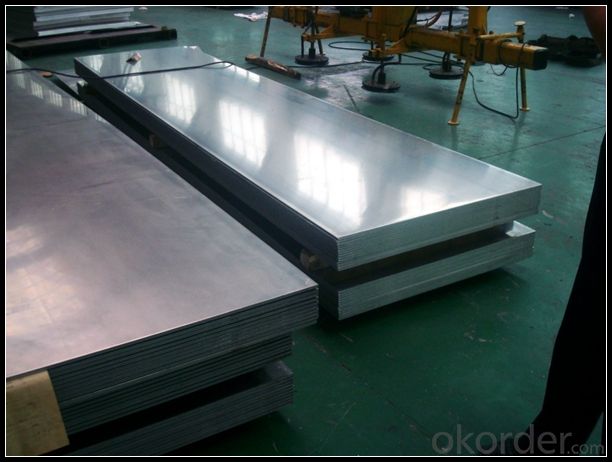
6. Package and shipping of Corrugated Aluminum Alloy Sheets for Metal Wall Systems
First, plastic cloth with drying agent inside; Second, Pearl Wool ; Third, wooden cases with dry agent , fumigation wooden pallets, aluminum surface could cover blue PVC film
7. FAQ
1) What is the delivery time?
Dpends on actual order, around 20 to 35 days
2)What is the QC system:
We have QC staff of 20 persons and advanced equipment, each production is with MTC traced from Aluminum ingot lot.
3) What market do you mainly sell to?
Australia, America, Asia, Middle East, Western Europe, Africa etc
- Q: Can aluminum sheet be used for heat exchangers?
- Yes, aluminum sheet can be used for heat exchangers. Aluminum is a commonly used material for heat exchangers due to its excellent thermal conductivity, light weight, and corrosion resistance. The high thermal conductivity of aluminum allows for efficient transfer of heat between fluids, making it suitable for various heat exchange applications. Additionally, aluminum is available in different alloys and thicknesses, providing flexibility in design and customization for specific heat exchanger requirements. Overall, aluminum sheet is a popular choice for heat exchangers in industries such as automotive, HVAC, and aerospace.
- Q: Are the aluminum sheets suitable for manufacturing automotive body panels?
- Yes, aluminum sheets are suitable for manufacturing automotive body panels. Aluminum is a lightweight yet strong material that offers several advantages for automotive applications. Its high strength-to-weight ratio allows for improved fuel efficiency and better overall performance of the vehicle. Aluminum also has excellent corrosion resistance, making it suitable for withstanding harsh environmental conditions. Additionally, it can be easily formed and manipulated, allowing for complex designs and shapes required for automotive body panels. These characteristics make aluminum sheets a popular choice in the automotive industry for manufacturing body panels.
- Q: If something is wrong, what kind of glue can be used for bonding the stainless steel sheet and aluminum sheet? The area may be very big. What are some common or good glue to buy?
- There are two methods: 1 AB glue or epoxy resin adhesive. 2. If the thickness of the two plate is greater than 8MM, it can be fixed by flat screw. Hope to be available.
- Q: i know what aluminum is but oxide is not found on the periodic table, and the teacher also gave us a list of common oxidation numbers for polyatomic ions and it is not there also, can anyone help me?
- Mass Of Aluminum
- Q: What specific requirements or considerations are necessary when using aluminum sheets in marine environments?
- <p>In marine environments, aluminum sheets must meet specific requirements to ensure durability and resistance to corrosion. These include using high-grade aluminum alloys, such as 5083 or 5086, known for their excellent resistance to saltwater corrosion. Protective coatings like anodizing or applying marine-grade paints can further enhance corrosion resistance. Additionally, the aluminum sheets should be designed to withstand the harsh conditions of marine environments, including high humidity, UV radiation, and mechanical stress. Regular maintenance and inspection are also crucial to prevent corrosion and ensure the longevity of aluminum structures in marine settings.</p>
- Q: Are aluminum sheets suitable for roofing?
- Yes, aluminum sheets are suitable for roofing. They are lightweight, durable, and resistant to corrosion, making them an excellent choice for roofing materials. Additionally, aluminum sheets have good thermal properties, reflecting sunlight and helping to keep the building cool.
- Q: What is the typical density of aluminum sheets?
- Aluminum sheets usually have a density of around 2.7 grams per cubic centimeter (g/cm³). Unlike steel and other commonly utilized metals, aluminum is known for its lightweight nature and relatively low density. This characteristic makes aluminum sheets an ideal choice for multiple applications that require a material with less weight, including the aerospace industry, automotive manufacturing, and construction.
- Q: What are the standard sizes and availability of aluminum sheets in the market?
- The standard sizes and availability of aluminum sheets in the market can vary depending on the location and specific requirements. However, there are some commonly available sizes that can generally be found in most markets. In terms of thickness, aluminum sheets are commonly available in 0.02 to 0.2 inches (0.5 to 5 millimeters) thickness range. Thinner sheets (0.02 to 0.06 inches) are often used for lightweight applications such as signage or crafts, while thicker sheets (0.1 to 0.2 inches) are typically used for more heavy-duty applications like construction or industrial purposes. Regarding width and length, standard aluminum sheet sizes are often offered in 4 feet by 8 feet (48 inches by 96 inches) or 4 feet by 12 feet (48 inches by 144 inches). These dimensions are widely available and suitable for various applications. However, it's important to note that custom sizes can also be ordered or cut from larger sheets to meet specific project requirements. Availability of aluminum sheets can be found in various locations, including local hardware stores, metal suppliers, and online marketplaces. It is always recommended to check with local suppliers or conduct online research to determine the specific sizes and availability in your area. Additionally, different grades or alloys of aluminum may have varying availability, so it's essential to consider the specific requirements of your project when sourcing aluminum sheets.
- Q: Can aluminum sheets be bent or formed?
- Yes, aluminum sheets can be bent or formed due to their malleability and ductility.
- Q: Aluminum siding is essentially maintenence-free, extremelydurable, and is a great insulator, even better than brick. Brickleaks air through the mortar between the bricks, especially in olderhouses that need tuckpointing. My question is, do you feel sidingstill has a declasse connotation, or is it getting more acceptableas the years go on?
- Brick is certainly the most durable if taken care of properly. My second choice is aluminum siding, which is far more durable than vinyl siding any day. Vinyl is simply more affordable, which is why most home have it these days - whoever decided that aluminum siding declasses a home, is full of malarky.
Send your message to us
Colored Corrugated Aluminum Alloy Sheets for Metal Wall Systems in Las Vegas
- Loading Port:
- Shanghai
- Payment Terms:
- TT OR LC
- Min Order Qty:
- 5 m.t.
- Supply Capability:
- 10000 m.t./month
OKorder Service Pledge
OKorder Financial Service
Similar products
Hot products
Hot Searches
Related keywords
